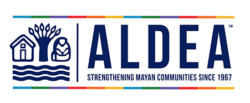
Palima was founded around 1960 and currently is home to 90 families. The community is located 16 miles from the municipal seat in the northern part of Tecpán. About 40 percent of the families living there are Catholics and 60 percent are Evangelicals. The name “Palima” means “lime fruit” in the Kaqchikel language, as it was an important area for the production of limes.
Agriculture is the main productive activity in Palima, particularly corn and beans but they also grow French beans, sweet peas, broccoli, tomatoes, coffee, and jocotes. Some men in the community work at larger farms for about $5 per day. The village has a school serving 91 students in kindergarten through primary levels. Palima does not have a health post, so if people get sick they have to go to the nearest one about half a mile away. About 90 percent of households have electric service, and the roads there are mostly dirt but are passable year-round.
Our Partnership:
Palima has never received support from the government or other agencies for development initiatives. ALDEA and ABPD began working with this community in July 2018. Our goal is to reduce chronic childhood malnutrition now, while supporting the community in building their capacity to address further development challenges on their own into the future. We are working together on:
- Water, Sanitation & Hygiene: A potable water system, sanitary latrines, gray water filters, and efficient vented stoves will reduce the risk of gastrointestinal diseases and improve indoor air quality, improving health and allowing children to make the most of the nutrients they consume. Work on these projects began in March 2019, and we expect them to be completed in February of 2020.
- Family Planning: We provide training and family planning methods so that women and men have the opportunity to decide the number and spacing of their children. Work began in July 2018 with completion expected in June 2020.
- Community Mobilization & Empowerment: Trainings and activities began in July 2018 with completion expected in June 2020.
- Nutrition Education: Trainings and activities began in July 2018 with completion expected in June 2020.
- Food Security (Sustainable Agriculture): Trainings and activities began in July 2018 with completion expected in June 2020.
- Disaster Risk Reduction: Activities began in July 2018 with completion expected in June 2020.
